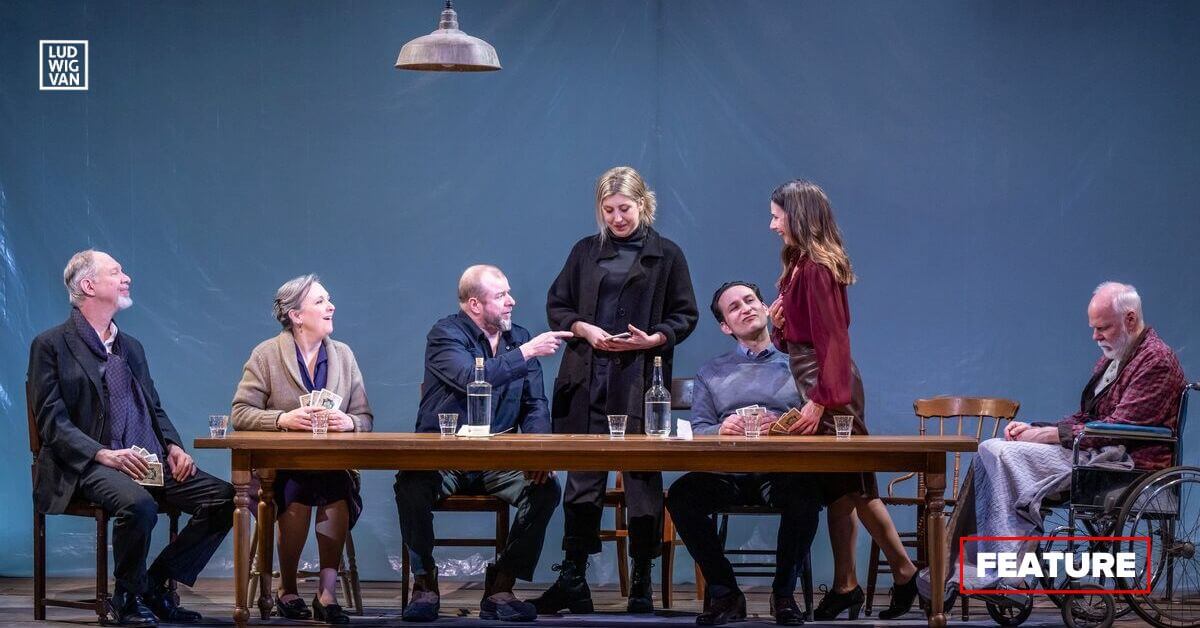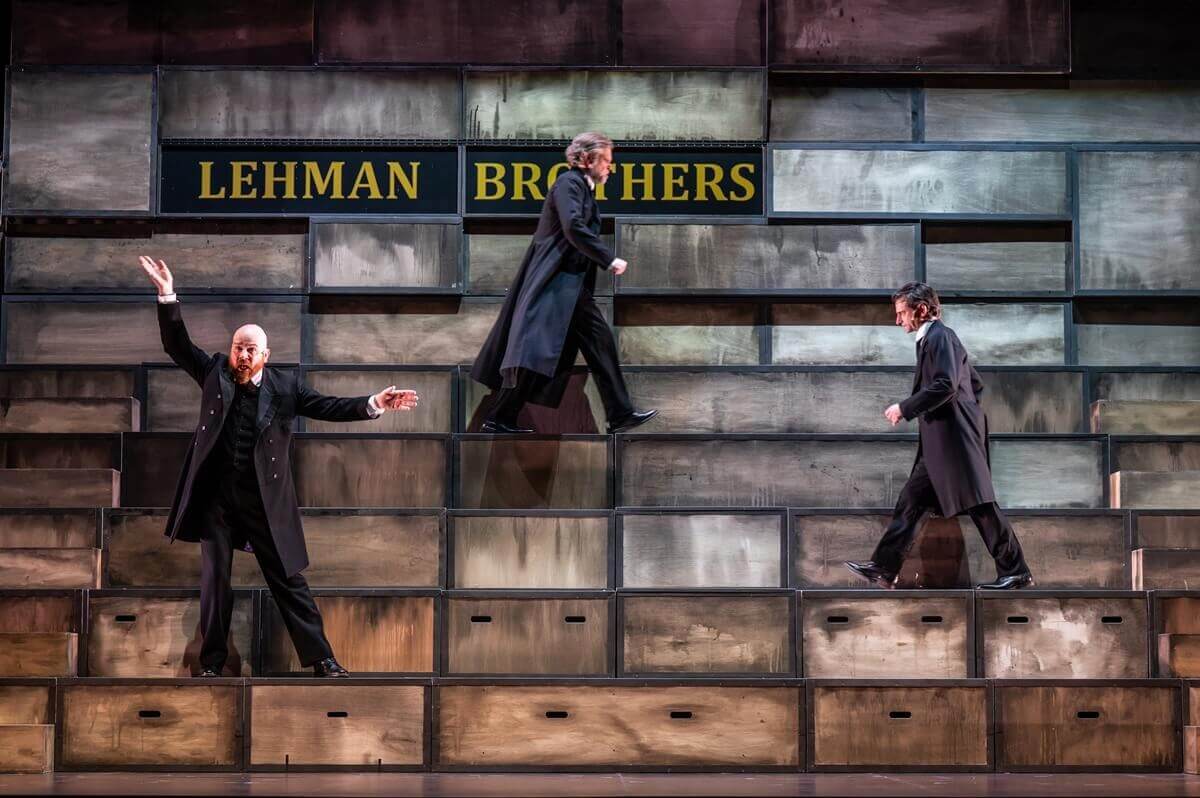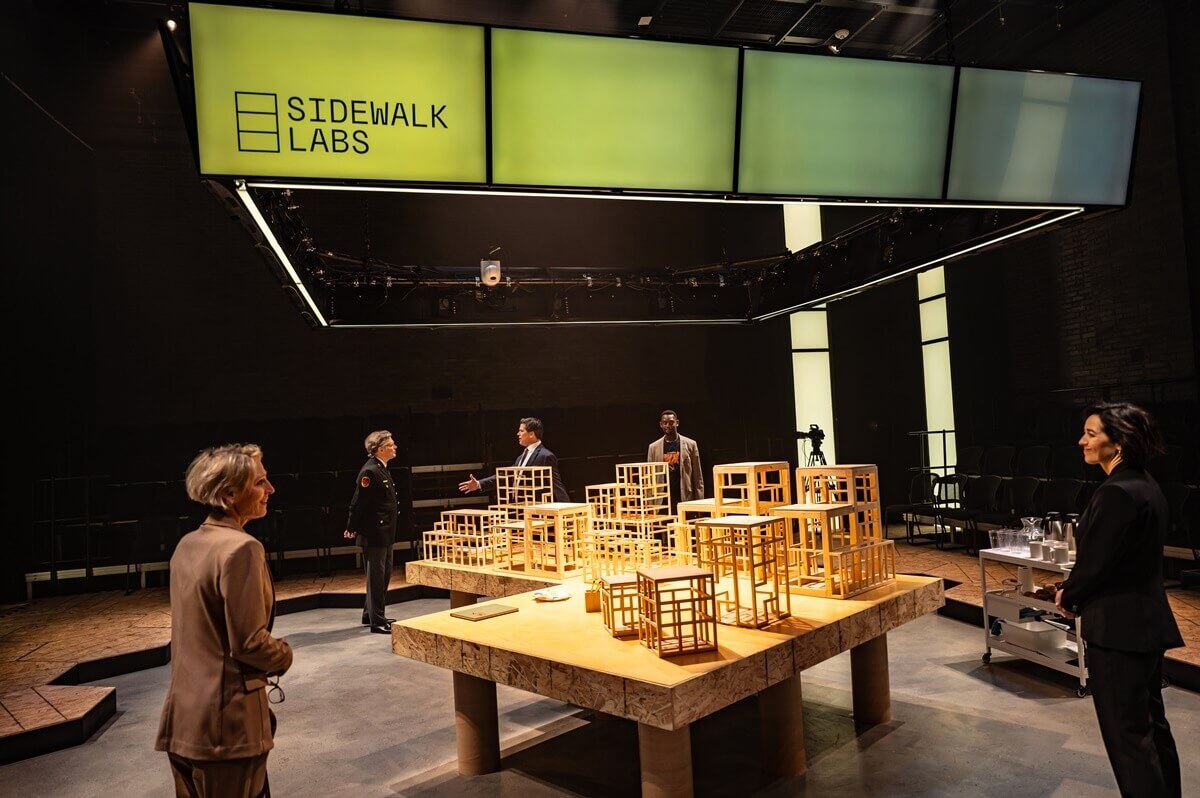
LvT theatre critic Paula Citron runs down the list of Toronto’s top ten theatre productions of 2023, including five honourable mentions, and a bottom feeder that makes the list too. It was an interesting year in Toronto’s theatre scene, and there is much to discuss.
The lists are presented in alphabetical order.
The Top Ten
Appropriate (Written by Branden Jacobs-Jenkins, directed by Ted Dykstra) Coal Mine Theatre
Appropriate (meaning suitable). Appropriate (meaning to take over). Those two different meanings of the same word were the flashpoint that triggered Branden Jacobs-Jenkins to write his 2014 very disturbing eponymous play. Here we meet the Arkansas Lafayette family, who have come to their decaying mansion to sort through their late father’s belongings for an estate sale, where they uncover a dark secret about said father. A singular fact is that Appropriate was written by a Black playwright who explores aspects of racism using all-White characters. Director Dykstra kept the pacing boiling and roiling using foul-mouth sister Toni (the brilliant Raquel Duffy) as the fulcrum, in a cast that was uniformly strong. A visit with the Lafayette family was harrowing, to say the least. As a play, Appropriate was absorbing, compelling, and at times shocking, because playwright Jacobs-Jenkins was relentless with the curve balls he threw at the audience.
Bad Roads (Written by Natal’ya Vorozhbit, translated by Sasha Dugdale, directed by Andrew Kushnir) Crow’s Theatre
Bad Roads by Ukrainian playwright Natal’ya Vorozhbit may well be one of the most disturbing evenings I have ever spent in the theatre. The six episodes, performed by seven superb actors, are set during the Donbass war that began in 2014 when separatists loyal to Russia declared independence from Ukraine. Vorozhbit put together her scenes using recorded firsthand accounts akin to verbatim theatre, personal recollections from friends and relatives, monologues written by teenage girls that she mentored, plus her own trip to the Donbass. Bad Roads, however, was not cold, dry docudrama. Rather, the material was masterfully woven into searing fiction that was based on fact. The realistic horrors of war that Vorozhbit presented were very difficult to sit through. Director Kushnir covered himself in glory with this tight production. Everything worked, which is why Bad Roads was such a powerhouse of a theatre experience.
Behind the Moon (Written by Anosh Irani, directed by Richard Rose) Tarragon Theatre
Anosh Irani’s world premiere Behind the Moon was a very powerful production. At one climactic point, my inner voice was shouting, “Please don’t kill him, please don’t kill him!” as one of the characters attacked another. That’s how much this play and its characters were getting to me. Qadir Bhai (Vik Sahay) is the owner of the fast food Mughlai Moon restaurant, and something is clearly not right in the way Ayub his cook (Ali Kazmi) cowers before his boss. Then there is the mysterious customer Jalal (Husein Madhavji) who impacts Ayub’s life in profound ways. At the core, this harrowing play deals with human trafficking, where immigrants, legal or not, are exploited by their own kind. Behind the Moon grabbed hold of you from the very beginning and didn’t let go until the startling ending, while Rose’s taut direction ensured a very uncomfortable ride for the audience.
Fifteen Dogs (Adapted and directed by Marie Farsi, based on the novel by André Alexis) Crow’s Theatre
Farsi managed the impossible in bringing this Canadian literary masterpiece to the stage. The much-honoured 2015 novel by André Alexis is an apologue, meaning, a moral fable about the human condition featuring animals as characters. The dogs in question are victims of a cruel wager between two Greek gods, and in astonishing fashion, Farsi brought the animals to life. The physicality, the vocalise, the delivery by the actors was brilliantly executed as they moved between being dogs, humans and narrators, and the fact that the cast had only six actors is truly mind-boggling. Farsi’s production never let us forget that this is a fable about humankind, showing us the suffering and the cruelty, offset by the kindness and the loyalty. The whole philosophical sweep of love, death and life was there in this adaptation for the stage. This production was simply a magnificent directorial accomplishment.
Kelly v. Kelly (By Britta Johnson (composer & lyricist) and Sara Farb (book), choreographed and directed by Tracey Flye) Musical Stage Company and Canadian Stage
This original Canadian musical was simply sensational. It could play on Broadway right now. The story, which was based on true events that happened in New York in 1915, defied belief. The aristocratic Helen Kelly (Jessica Sherman) charged her rebellious daughter Eugenia (Eva Foote) with incorrigibility because of her affair with a charismatic tango dancer (Jeremy Walmsley), tango being the great satan of the age. At the trial, Eugenia represented herself in flippant fashion, while Helen was represented by a smarmy lawyer (Joel Cumber). Using a parade of witnesses and a series of flashbacks, the clever songs took us through this sordid tale, interpolated by stunning dances. The cast was spectacular, as was Tracey Flye’s direction and choreography. Alex Amini’s 1915 costumes were also gorgeous. The story of a mother having her daughter arrested for what was tantamount to being independent, proved to be absolutely riveting.

The Lehman Trilogy (Written by Stefano Cassini, adapted by Ben Power, directed by Philip Akin) Canadian Stage
In this mind-boggling epic, the three German-Jewish Lehman brothers, Henry, Emmanuel, and Mayer, played by Ben Carlson, Graeme Somerville and Jordon Pettle, respectively, arrived in the United States in 1844, in search of the American dream. Through the device of narration, interpolated by brief scenes, the play traces the brothers from the humble beginnings of their dry goods store in Montgomery, Alabama, to ending up owning one the world’s largest investment banks. Of course, Lehman Brothers is infamously known today for its spectacular 2008 collapse, which triggered one of the worst financial crises since the Great Depression. What is absolutely astonishing is that the above mentioned three actors played all the parts magnificently which included the brothers, wives, sons, grandsons, and everyone else. The Lehman Trilogy was brilliant, provocative theatre, and kudos to director Akin and his superb cast for pulling off this monumental undertaking.
Natasha, Pierre & The Great Comet of 1812 (Book, music, lyrics and orchestrations by Dave Malloy, adapted from Leo Tolstoy’s War and Peace, directed by Chris Abraham) Musical Stage Company and Crow’s Theatre
The sumptuous production of this sung-through electropop opera was a triumph in every respect. Creator Malloy chose a 70-page tract from Part 8 of Book Two, of Tolstoy’s mammoth epic, which describes two arcs — Natasha Rostova (Hailey Gillis), and her infatuation with the scoundrel Anatole Kuragin (George Krissa), and melancholy Pierre Bezukhov (Evan Buliung) and his search for direction in his meaningless life. The other characters are mostly entwined between the two. From the moment you entered the theatre, you were aware of the magnificent set by Julie Fox and Joshua Quinlan, gilded by Ming Wong’s gorgeous Napoleonic era costumes. Malloy’s music is enchanting because of its very diversity. Which brings us to the 13 uber-talented singing actors who performed from the heart. Director Abraham never let the pacing flag for one minute, in this production that was an embarrassment of riches.
Sizwe Banzi Is Dead (By Athol Fugard, John Kani and Winston Ntshona, directed by Mumbi Tendyebwa Otu) Soulpepper Theatre Company
This 1972 South African play still packs a punch as Otu’s production proved in brilliant fashion. While set in the Apartheid era, this searing play can still speak to racial injustices that are ongoing around the globe. In the play, we meet three Black men, the photographer Styles (Amaka Umeh), Sizwe Banzi (Tawiah M’Carthy) and Sizwe’s new found friend Buntu (also Umeh). In a complex series of monologues and flashbacks, we discover how Styles and Sizwe are connected. Director Otu was relentless in pushing out character, while keeping tight control on the pacing. The performances were outstanding. Umeh was Hamlet last season at Stratford, so playing men is not strange to her. The actor has charisma on steroids, and while she was in your face, M’Carthy’s more subdued performance was a vibrant if poignant contrast. Everything about this production worked — acting, set, lighting — not a false move anywhere.
The Master Plan (Written by Michael Healey, based on a book by Josh O’Kane, directed by Chris Abraham) Crow’s Theatre
The play is based on Josh O’Kane’s bestseller, Sideways: The City Google Couldn’t Buy. In a divine moment of inspiration, Crow’s Theatre’s artistic director, Chris Abraham commissioned Michael Healey to convert the book into a play, Healey being one of Canada’s great political satirists. The result is a play that was a wild theatrical ride filled with colourful characters, boardroom intrigues, and all manner of corporate shenanigans. In the final analysis, it was American Big Tech versus Canadian city government, Goliath versus David, so to speak. Director Abraham set a furious pace as facts and figures literally assaulted the audience a mile a minute in this mad dash of a story, but Abraham also ensured that fully developed characters were on the stage. His cast, led by Mike Shara’s over-confidant Ugly American, was simply superb, while Joshua Quinlan’s techno set was absolutely masterful.

The Seagull (By Anton Chekhov, adapted by Simon Stephens, directed by Daniel Brooks) Soulpepper Theatre Company
This riveting production of a Chekhovian masterpiece was the late Daniel Brooks’ swan song, but what an end game he gave us. British playwright Stephens set the play in contemporary times, but all the tortured relationships of the original are intact, only in a clever modern context. As a director, Brooks could always bring out character, and every one of his all-star cast, led by Michele Monteith as Irina, Paolo Santalucia as Konstantin, and Hailey Gillis as Nina, was simply superb. We knew these people. We felt the ennui of the city folk, and the discomfort of the country folk. We laughed with them, we cried with them, and we definitely got annoyed with them. And of course, like all Brooksian productions, there were clever and surprising directorial touches. What a brilliant good-bye from the very talented Daniel Brooks. He will be greatly missed.
Five Honourable Mentions
- Fairview (By Jackie Sibblies Drury, directed by Tawiah M’Carthy) Canadian Stage and Obsidian Theatre
- Prodigal (Written and directed by Paolo Santalucia) The Howland Company, in association with Crow’s Theatre
- The Chinese Lady (By Lloyd Suh, directed by Marjorie Chan) Studio 180 Theatre, fu-Gen Asian Canadian Theatre Company, in association with Crow’s Theatre
- The Sound Inside (Written by Adam Rapp, directed by Leora Morris) Coal Mine Theatre
- Yerma (Written by Simon Stone after Federico Garcia Lorca, directed by Diana Bentley) Coal Mine Theatre
The Bottom Feeder
God of Carnage (By Yasmina Reza, translated by Christopher Hampton, directed by Mark Datuin) The Toronto Stage Company
If ever there was a vanity project, this is it, and judging from his director’s notes in the program, I lay the blame at the feet of Mark Datuin. Apparently, seeing this brilliant 2009 Tony/Olivier Award-winning play was his first foray to a Broadway theatre, which led to his wanting to mount it down the line. Datuin’s background is in film, and that’s perhaps where he should have stayed, because what ended up on stage was amateur level stuff. This clever play features two couples who come together because their children were in a schoolyard fight, and end up coming to blows themselves. While the two male actors (Luke Marty and Jarrod W. Clegg) were comparatively competent, the two women (Angelica Alejandro and Amy Slattery) were absolutely hopeless. It is a mark of the excellence of Reza’s play that this dreadful production couldn’t totally erase its dramatic strength.
Are you looking to promote an event? Have a news tip? Need to know the best events happening this weekend? Send us a note.
#LUDWIGVAN
Get the daily arts news straight to your inbox.
Sign up for the Ludwig Van Toronto e-Blast! — local classical music and opera news straight to your inbox HERE.
- INTERVIEW | Actor Diego Matamoros Takes On Icon Walt Disney In Soulpepper Production Of Hnath Play - April 16, 2024
- SCRUTINY | Opera In Concert Shine A Light On Verdi’s Seldom Heard La Battaglia Di Legnano - April 9, 2024
- SCRUTINY | Lepage & Côté’s Hamlet Dazzles With Dance And Stagecraft Without Saying Anything New - April 5, 2024



